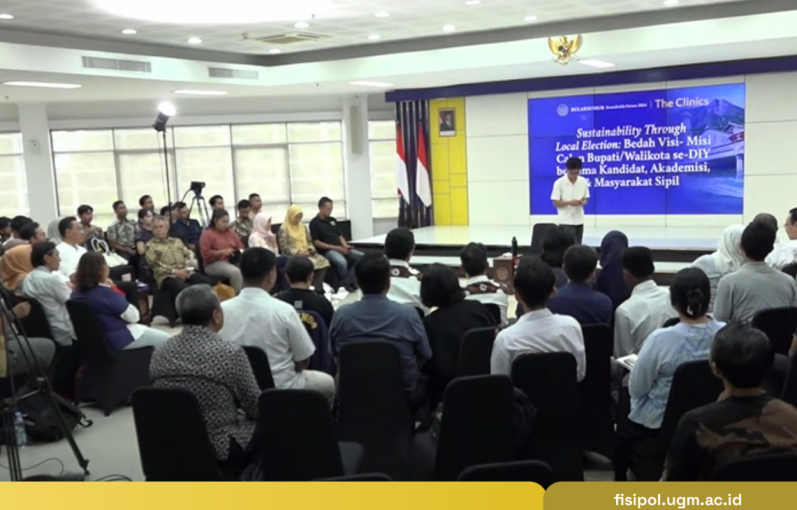
Yogyakarta, October 30th─Welcoming the 2024 Regional Head Elections (Pilkada) in Indonesia on November 27th 2024, the Bulaksumur Roundtable Forum together with the Election Corner of the Department of Politics and Government (DPP) UGM invited three pairs of mayoral candidates of Yogyakarta City. The event was held on Wednesday (30/10) at the Faculty of Social and Political Sciences of UGM.
Yogyakarta City as the capital of the Province of D.I. Yogyakarta is certainly the center of government and economy. Administratively, Yogyakarta City has a small area compared to other level II regions. There are 14 sub-districts, 45 urban villages, 617 RW, and 2,531 RT, and inhabited by 375,780 people. Most of the people work in the fields of MSMEs and tourism.
Candidate pair number 1, Heroe Poerwadi and Sri Widya Supena called Yogyakarta City the backbone of Yogyakarta Province. “Yogyakarta City relies more on services, not natural resources. We have to see how we can improve Yogyakarta’s excellence,” Heroe explained. The focus of the vision and mission of this candidate pair is strengthening human resources, expanding access to health and basic needs of the community.
Heroe also wants digitalization to help small businesses that support Yogyakarta’s economy. Later, the community can sell their products more optimally. “There are many good products. But how we sell them is another matter. This is what we will manage together,” he added. Therefore, the digital competence of the community also needs to be honed along with access to education.
Then candidate pair number 2, Hasto Wardoyo and Wawan Hermawan also conveyed their vision and mission and program. Hasto said the main component in the preparation of their mission was the Sustainable Development Goals (SDGs). Hasto wants to focus on creating superior human resources that can improve people’s welfare, as well as solving the waste issue.
Therefore, the candidate pair number 2 also created a program to help community MSMEs so that they do not depend on the industry and are able to open new job opportunities for other people. “Market law, which occurs in relation to low wages in Yogyakarta. So in the future, Hasto-Wawan will replicate the micro ones so that they are not dependent and are able to work independently, become entrepreneurs themselves. If you want this much, you have the bargaining position,” said Hasto.
In addressing the waste problem, Hasto revealed that his government will create a waste flow and management system. He conveyed this focus along with the urgency of environmental health and hygiene for the community. According to him, the unresolved waste problem will cause further problems in the future.
Unlike candidate pairs number 1 and 2, candidate pair number 3 focuses on the issue of tolerance and mutual cooperation. Muhammad Afnan Hadikusumo and Singgih Raharjo revealed that government programs will not run without the support of the community. To realize this, the government must be inclusive of all elements of Yogyakarta society. The gotong royong aspect is also considered as a symbol of collaboration between government sectors, parties, and the community.
Political expert, Prof. Amalinda Savirani who is also a lecturer at the Department of Politics and Government responded to the vision and mission and programs of the three candidates. In her response, she mentioned that Yogyakarta faces issues of unusually hot temperatures, soaring housing and land prices, and waste issues. Although the tourism sector has never lost its visitors, the community’s income is still far below other regions.
“The highlight is also how to manage waste from upstream to downstream. Plastic waste produced by large companies is a problem upstream, it is important that there are regulations, what kind of policies in the future,” Amalinda concluded. The government in the future needs to be more responsive to the chronic waste problem in Yogyakarta.
Bulaksumur Roundtable Forum (BRF) was organized as a form of collaboration between the academic and education sectors. People as the owners of voting rights need to know who the local government candidates are, so that they can make good choices. Therefore, this event also supports the 16th Sustainable Development Goals (SDGs), namely Peace, Justice and Strong Institutions.
